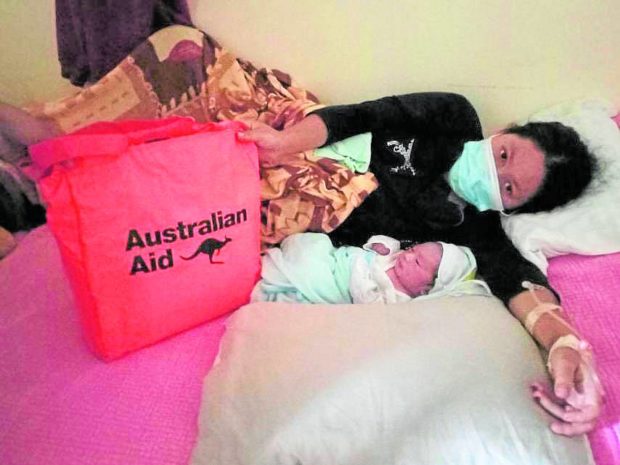UN: Include calamity aid for vulnerable moms, babies

LONG-RUNNING CHALLENGE Aid donors are encouraged to also consider the needs of new mothers like “Jane,” one of the women in Dinagat Islands who received help from the United Nations Population Fund (UNFPA) after being displaced by Typhoon “Odette” (international name: Rai). —PHOTO FROM UNFPA
MANILA, Philippines — When Typhoon Odette (international name: Rai) slammed into the Dinagat Islands two weeks ago, a heavily pregnant “Jane” prayed hard that she would not go into labor that night.
As violent winds and heavy rains tore through her hometown of Cagdianao, the 20-year-old stayed for hours in the bathroom — the only concrete structure in the house — to keep herself and her unborn baby safe. The next morning, the family discovered that a felled coconut tree had crashed into their home and that the roof had been ripped off.
Fortunately, Jane did not experience labor pains until Dec. 27. But with the local birthing facility damaged by the typhoon as well, she had to take a tricycle to get to the nearest hospital 20 kilometers away.
Jane is among the 537,309 women and girls in 13 provinces in the southern Philippines who were heavily affected by the aftermath of Odette, the United Nations Population Fund (UNFPA) said on Wednesday. Long-running challenges, like gender-based violence and access to reproductive health care, worsen their situation during emergencies and humanitarian crises like typhoons, it said.
Protection mechanisms
The UNFPA called on the Philippine government to swiftly restore protection mechanisms and services in the typhoon-affected areas, including hospitals and clinics, to protect the sector.
It also sought urgent donations to help provide medical supplies and raise funds to help pregnant women, lactating mothers,and their newborns, adolescents and young people, and women with disabilities.
According to its situation report published this week—the UNFPA’s first since Odette hit the country on Dec. 16 — at least 17,606 pregnant women were among those affected by the typhoon, and 5,000 pregnant women were displaced.
Many of them come from Eastern Visayas (6,754) and Western Visayas (5,202), which were the most severely hit by the typhoon.
The numbers were consolidated from the Department of Social Welfare and Development’s disaster risk monitoring report for the most heavily affected provinces, including Dinagat Islands, Surigao del Norte, Leyte, Negros Occidental and Palawan.
The Dinagat Islands, Surigao del Norte, Surigao City and Siargao have “very limited predisaster capacity on maternal health and are experiencing significant disruption of sexual and reproductive health service,” the UNFPA said.
Such was the case of Jane, who had to travel 20 km from Cagdianao to Dinagat District Hospital to deliver her baby.
Increased risk
With communities in tatters and households scrambling to rebuild, the risk of gender-based violence (GBV) is expected to increase in their communities, the UNFPA warned.
It estimated that at least 31 GBV service centers (e.g., women and children protection units) across the Visayas were affected by the typhoon.
In Surigao City alone, four new cases of domestic violence were recorded between Dec. 16 and Dec. 21, according to Police Lt. Aireen Viador of the Surigao City Philippine National Police Women and Children Protection Desk.
Viador told the UNFPA that just hours after Odette barreled into the city, a GBV survivor came to the police station to complain that her husband had hit her.
“We’re afraid that GBV cases, particularly domestic violence, may increase inside evacuation centers,” Viador added.
For now, local and international organizations are helping fill the gap in social services in the afflicted area.
The UNFPA, for example, has set up emergency maternity tent facilities to augment destroyed health centers. Maternity packs are given to mothers and their newborns.
The agency has also distributed “dignity kits” containing essential health supplies to women and girls of reproductive age.
But ultimately, the UNFPA said, it would monitor and continue to advocate for the reactivation of protection mechanisms and access to gender-based services to support the care and recovery of survivors.